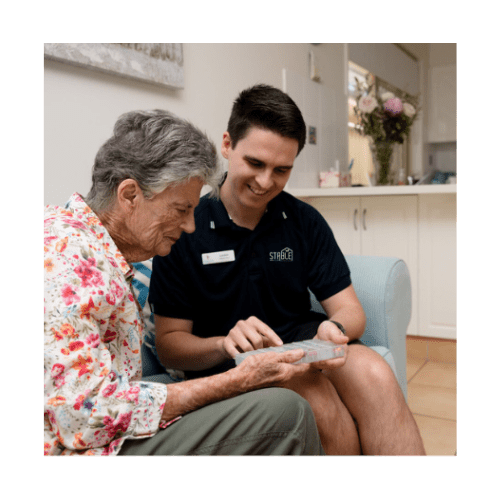Just How In Home Care Givers Address the Distinct Difficulties and Psychological Needs of Family Members Seeking Support for Their Loved Ones
In-home caretakers play a critical role in navigating the intricacies faced by family members looking for support for their loved ones. By recognizing unique household dynamics and providing customized emotional assistance, these specialists not just address instant care demands but likewise promote an environment of trust fund and open interaction (home care providers australia).
Understanding Family Dynamics
Recognizing household characteristics is critical for giving effective at home treatment, as each household runs within a special collection of relationships and communications. These characteristics encompass various elements, including interaction designs, roles, and power structures that influence exactly how treatment is delivered and received. The caregiver has to recognize these factors to guarantee that care strategies line up with the family members's values and assumptions.
Different families may show unique patterns of interaction, such as collaborative methods or ordered frameworks. For circumstances, in some families, a primary decision-maker might hold considerable influence, while in others, choices may be extra autonomous. Comprehending these patterns helps caregivers customize their methods to fit the family members's specific demands.
In addition, social backgrounds play a vital role in forming family characteristics. Caregivers must be culturally competent, acknowledging and respecting diverse practices and ideas that might influence treatment choices.
Ultimately, a thorough understanding of family members characteristics assists in improved interaction, fosters count on, and improves the caregiver's ability to support the family successfully. By identifying the intricate web of connections and obligations, caretakers can develop a helpful environment that promotes health for both the individual getting treatment and the family as a whole.
Providing Emotional Support
Providing psychological support is an important part of in-home care that substantially enhances the wellness of both the specific receiving care and their relative. In the context of caregiving, psychological assistance involves active listening, compassion, and recognition of feelings. Caregivers are educated to recognize the emotional battles that families face, such as seclusion, stress and anxiety, and regret, and to supply a compassionate presence that relieves these worries.
By fostering open interaction, caregivers produce a secure space for family participants to reveal their fears and concerns. This dialogue not just encourages psychological release however likewise strengthens count on between the caregiver and the household. In addition, caretakers can provide sensible techniques to assist households take care of stress and advertise strength.

Eventually, the emotional assistance given by in-home caretakers boosts the quality of life for both clients and their family members, promoting a more compassionate and understanding caregiving atmosphere. This holistic method ensures that psychological demands are addressed alongside physical health and wellness considerations.
Managing Daily Treatment Tasks
Handling daily treatment tasks is an important aspect of in-home care that makes certain people get the support they require to preserve their health and wellness and freedom. Caretakers play a crucial role in helping with activities of daily living (ADLs), that include showering, dressing, brushing, and meal preparation. By taking on these responsibilities, caregivers aid ease click for more the physical and emotional burdens that family members may deal with while caring for their loved ones.
Along with individual care, caretakers are likewise tasked with medicine monitoring, making sure that customers follow suggested timetables and does. This oversight is critical for maintaining wellness and preventing adverse results from missed out on or incorrect medicines. In addition, caretakers typically assist with wheelchair, offering assistance for clients moving their homes, thereby reducing the danger of falls and boosting general safety.

Cultivating Open Interaction
Effective management of day-to-day treatment jobs usually rests on the quality of communication in between caretakers, customers, and their families. Open up interaction promotes a setting where issues, preferences, and responses can be easily exchanged, guaranteeing that care is tailored to satisfy specific demands. Caretakers ought to focus on regular check-ins with both clients and their families, promoting conversations that address any type of issues or changes in care demands.
Making use of various interaction approaches-- such as face-to-face conferences, phone calls, and created check out this site updates-- can boost understanding and offer families with satisfaction. It's essential for caregivers to proactively listen, showing compassion and regard for the emotional landscape of the family. Motivating inquiries from family participants can also help clear up care plans and strengthen the caretaker's dedication to openness.
Moreover, preserving open lines of communication enables caretakers to acknowledge and react promptly to any type of changes in a client's wellness status or emotional wellness. This positive strategy not only strengthens the caregiver-client vibrant however additionally encourages households to take part proactively in the care procedure. Eventually, promoting open interaction is important for boosting the high quality of in-home care and promoting a supportive ambience for all entailed.
Building Trust and Relationships
Trust fund is the foundation of successful in-home treatment, as it establishes a foundation for purposeful connections between caregivers, clients, and their family members. Structure this trust fund needs constant, transparent interaction and a real commitment to the wellness of those involved. Caregivers should demonstrate dependability through preparation, adherence to care strategies, and responsiveness to the requirements and preferences of clients.
To foster trust fund, caregivers need to take part in active listening, making certain that click for source families feel listened to and recognized. This includes not just resolving immediate concerns but also anticipating future requirements, therefore encouraging family members and improving their feeling of control. Developing relationship via shared experiences and respectful interactions can better strengthen these relationships.
Additionally, caretakers must be trained to recognize and address the psychological complexities faced by families. By revealing empathy and concern, they can reduce unpredictabilities and concerns, enhancing depend on. Regular updates and check-ins with relative can additionally improve openness, allowing them to really feel involved and informed about their loved one's care.
Inevitably, building trust and nurturing relationships in in-home treatment is a joint procedure that substantially impacts the top quality of care offered, fostering a supportive environment that profits everybody involved.
Final Thought
In-home caretakers play a vital function in dealing with the one-of-a-kind difficulties and psychological needs of households. By understanding household dynamics, providing psychological assistance, and promoting open interaction, caregivers improve the total caregiving experience. Their capability to take care of daily care jobs while developing trust fund and strong relationships cultivates a helpful atmosphere for clients and their family members. Inevitably, the compassionate engagement of caregivers significantly adds to enhanced wellness and resilience for those navigating the intricacies of caregiving.
Recognizing household dynamics is vital for providing efficient in-home care, as each family operates within a distinct set of communications and partnerships.Offering emotional assistance is an important component of in-home care that dramatically improves the well-being of both the specific obtaining care and their household members. By taking on these responsibilities, caretakers aid ease the physical and emotional problems that family members may face while caring for their enjoyed ones.
Efficient administration of everyday treatment tasks frequently pivots on the top quality of interaction between caregivers, clients, and their households - ndis plan manager.Trust fund is the cornerstone of successful in-home care, as it develops a structure for significant connections in between caretakers, clients, and their families